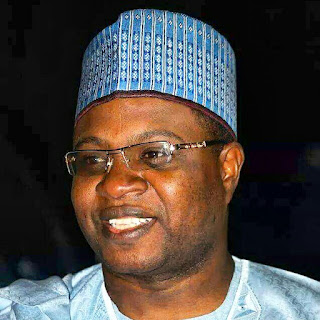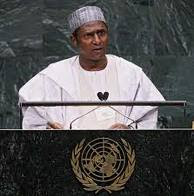Meet Nigeria’s Facebook politicians

General Muhammadu Buhari (rtd)
Apart from being the first black to become the United States president, the emergence of Barack Obama also made popular the crucial role of internet-based social networks, particularly Facebook in socio-political and economic development. Obama engaged the social networking utility during his campaign, particularly targeting students and youths.
Nigerian politicians and public office-holders are not left out either. Some of the prominent politicians that have signed on include President Goodluck Jonathan, Speaker Dimeji Bankole, Vice President Namadi Sambo, former Vice President Atiku Abubakar, former President Ibrahim Badamasi Babangida, former Head of State General Muhammadu Buhari, and the National Security Adviser retired General Aliyu Muhammed Gusau.
Former Economic and Financial Crimes Commission (EFCC) boss, Malam Nuhu Ribadu; former Presidential Adviser on Public Affairs and Minister of Aviation, Chief Femi Fani-Kayode and former Federal Capital Territory (FCT) ministers Dr Aliyu Modibbo Umar and Malam Nasir el-Rufa’i are among the early former public office holders that are actively involved.
Others include former Governors Alhaji Attahiru Bafarawa, Adamu Mu’azu and Donald Duke currently maintain Facebook pages. Also, Governors Patrick Yakowa of Kaduna State; Godswill Akpabio of Akwa Ibom; Malam Isa Yuguda of Bauchi are currently among the serving governors with active Facebook accounts.
Hajiya Naja’atu Muhammed, a Kano-based radical politician; retired General Theophillus Danjuma, Chairman, Presidential Advisory Council (PAC); Farida Waziri, EFCC Chairperson and former President Obasanjo, all have Facebook addresses.
Apart from using the medium to advance their political ideals, the politicians, especially governors use it to showcase their executed projects while the ex-public servants like el-Rufa’i, Ribadu and Kayode utilise the avenue to engage in public discourse.
The status updates of most of the politicians are true reflections of their personality and what they think of others. For instance, Fani-Kayode, controversial former aide to Obasanjo, posted on his status update last night, that: “What we often call the Northern Protectorate of Nigeria today can be better described as the poor husband whilst its Southern counterpart can be fairly described as the rich wife or the woman of substance and means. A forced union of marriage between the two will undoubtedly result in peace, prosperity and marital bliss for both husband and wife for many years to come.”
Then on President Jonathan’s page, it read: “Today, in fulfilment of the promise I made at the 26th convocation of the University of Port Harcourt on Saturday, 15 May 2010, I have created a Facebook fan page to interact with Nigerians. As I said on that day, there is an unchallengeable power of good in the Nigerian nation and her youth and through this medium I want Nigerians to give me the privilege of relating with them without the trappings of office.” He signed it with his initials, GE.
On July 4th he posted a call for suggestions pertaining to improving the power supply to citizens, and on July 5th he updated his status to read: “Yesterday a youth named Toyin Dawodu indicated that he had an idea for a project that could deliver 4,000 MWs of electricity. I believe in the creativity and the spirit of innovation resident in our youth and I want to give Toyin Dawodu a chance to be heard. Toyin, someone from my office will make contact with you regarding your idea. I know I cannot attend to every comment or suggestion due to time constraints, but please do know that I read them and they influence my actions.”
According to Web Trends Nigeria, the Nigerian president amassed about 2,028 fans in about 9 hours after the page’s official launch on June 28, 2010. Social media analyst, Loy Okezie, noted that the page reached the 100,000 Facebook fan mark, essentially, in 17 days. “Right now his fan base is said to be within the region of 144,000.”
President Jonathan in one of hid updates said: “I want to assure you that your feedback and comments on this page are important. I read them and they have influenced government’s policy.” When Jonathan recently reversed a ruling to ban the Nigerian football team from international play due to their poor performance at the World Cup, he cited several Facebook comments as key to his decision. But according to official Facebook statistics, less than 2% of Nigerians currently use Facebook.
For General Ibrahim Babangida, the page opened by his supporters is mostly for campaign activities. Pat Utomi has close to 50,000 fans on Facebook. Malam Nasiru El-rufai uses his page for campaigning. His page recorded more than 3,000 comments immediately he posted his Save Nigeria Group campaign invitation in the heat of the Yar’adua absence saga. He recently through Facebook called for a business enterprise contest where two youth won $5000 to start their own business.
An IT expert who spoke on condition of anonymity said it is difficult for President Goodluck Jonathan or any other candidate for that matter to respond to the huge amount of mail on their Facebook or other social networking site. “Ideally someone or a group of people are normally employed to host the page and respond to fans and the general public. I learnt that President Jonathan employed someone who is handsomely paid to manage his page. In the case of President Barack Obama, group young men were specifically employed to host his pages in all the social networking sites and respond on his behalf after seeking clearance from the presidency. If Jonathan were to respond to the several messages on his page, then governance would grind to a halt.”
Mr. Osita Okechukwu, Spokesman for Conference of Nigerian Political Parties (CNPP) and a chieftain of Congress for Progressive Change (CPC), said Facebook and other social networking sites are the in-thing now among political parties. “We are using Facebook and other social networking sites to reach our teeming supporters nationwide. Any political party that is not utilising social networking now, I don’t know what they will use because it is very effective. We don’t have the kind of money newspapers are asking for advertisement, so we rely on social networking because it is cheaper. The feedback we are getting is that people trust General Muhammadu Buhari and they believe he can deliver.” And with that, the sounds of daggers drawn, although on the internet, are made in anticipation of 2011. As a poster on one of the politicians’ said: “Facebook will, whether anyone likes it or not, play an important role in Nigerian politics really soon.

Comments
Post a Comment